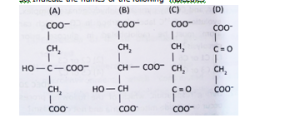- Indicate the names of the following molecules
(1) A= isocitrate, B = α-ketoglutarate, C = oxaloacetate, D = citrate
(2) A= citrate, B = isocitrate, C = α -ketoglutarate, D = oxaloacetate
(3) A= isocitrate, B = citrate, C = α -ketoglutarate, D = oxaloacetate
(4) A= citrate, B = isocitrate, C = oxaloacetate, D = α – ketoglutarate

The tricarboxylic acid (TCA) cycle, also known as the Krebs cycle, involves a series of biochemical reactions that convert acetyl-CoA into energy-rich molecules. Each step features specific intermediates critical for the cycle’s progression. Correctly identifying these intermediates is essential for understanding the metabolic flow.
This article clarifies the names of molecules A, B, C, and D in the TCA cycle based on their sequence and structure.
Overview of Key TCA Cycle Intermediates
The TCA cycle begins with the condensation of acetyl-CoA and oxaloacetate to form citrate, followed by its conversion into isocitrate, then α-ketoglutarate, and later oxaloacetate is regenerated at the end of the cycle.
The typical sequence of these intermediates is:
-
Citrate (6 carbons): The first product formed by citrate synthase.
-
Isocitrate (6 carbons): An isomer of citrate formed via aconitase.
-
α-Ketoglutarate (5 carbons): Produced by oxidative decarboxylation of isocitrate.
-
Oxaloacetate (4 carbons): Regenerated at the end of the cycle to combine with acetyl-CoA.
Assigning Molecules A, B, C, and D
Based on the sequence:
-
A = Citrate (first intermediate after acetyl-CoA entry)
-
B = Isocitrate (isomer of citrate)
-
C = α-Ketoglutarate (produced after isocitrate oxidation)
-
D = Oxaloacetate (regenerated at cycle end)
This matches option:
(2) A = citrate, B = isocitrate, C = α-ketoglutarate, D = oxaloacetate
Summary Table
Molecule Name Role in TCA Cycle A Citrate First intermediate formed from acetyl-CoA and oxaloacetate B Isocitrate Isomer of citrate, substrate for isocitrate dehydrogenase C α-Ketoglutarate Produced by oxidative decarboxylation of isocitrate D Oxaloacetate Regenerated at cycle end, combines with acetyl-CoA
Conclusion
The correct identification of the TCA cycle intermediates A, B, C, and D is:
A = citrate, B = isocitrate, C = α-ketoglutarate, D = oxaloacetate
This sequence reflects the order of metabolites in the citric acid cycle and their roles in energy metabolism.
Correct answer: (2) A= citrate, B = isocitrate, C = α-ketoglutarate, D = oxaloacetate
-




25 Comments
Kirti Agarwal
September 18, 2025Opt d
Neha Yadav
September 20, 2025A = citrate, B = isocitrate, C = α-ketoglutarate, D = oxaloacetate
Bhawna Choudhary
September 21, 2025(2) A = citrate, B = isocitrate, C = α-ketoglutarate, D = oxaloacetate
Sonal Nagar
September 22, 2025option 2
HIMANI FAUJDAR
September 23, 2025Ans A = citrate ,B= Isocitrate ,C= α-ketoglutarate
D= oxaloacetate.
Pallavi Ghangas
September 23, 2025A = citrate, B = isocitrate, C = α-ketoglutarate, D = oxaloacetate
Aakansha sharma Sharma
September 23, 2025(2) A= citrate, B = isocitrate, C = α -ketoglutarate, D = oxaloacetate
Heena Mahlawat
September 24, 2025Option 2
Roopal Sharma
September 24, 2025B option is correct .
Nilofar Khan
September 24, 2025Correct answer is ( 2) A = citrate(6c), B = isocitrate(6c), C = α-ketoglutarate(5c), D = oxaloacetate(4c)
Deepika sheoran
September 24, 2025Option b is correct answer
Citrate
Isocitrate
Alpha keto glutarate
Oxaloacetate
Minal Sethi
September 24, 2025A= citrate, B = isocitrate, C = α -ketoglutarate, D = oxaloacetate
option 2
Soniya Shekhawat
September 25, 2025Option B is correct .
Mohd juber Ali
September 25, 2025Option 2 is right
Muskan singodiya
September 25, 2025A-citrate, B- isocitrate,C- alpha ketoglutarate,D- oxaloacetate
Kavita Choudhary
September 26, 2025Option 2 is right (A)Citrate,(B) isocitrate,(C) a- kito gultrate, (d) oxaloacitate
Avni
September 26, 2025Correct answer: (2) A= citrate, B = isocitrate, C = α-ketoglutarate, D = oxaloacetate
Varsha Tatla
September 27, 2025Option C
Arushi Saini
September 27, 2025A = citrate, B = isocitrate, C = α-ketoglutarate, D = oxaloacetate
Payal Gaur
September 27, 2025Option 2. (1) citrate (2) Isocitrate (3) alpha kitoglutrate (4) oxaloacetate
Kajal
October 2, 2025Option 2
Muskan Yadav
October 3, 2025Option (2) A = citrate, B = isocitrate, C = α-ketoglutarate, D = oxaloacetate is the correct order.
Santosh Saini
October 5, 2025A= citrate (6c) , B= isocitrate(6c) isomer of citrate , C= alpha ketoglutarate(5c) , D= Oxaloacetate (4c)
Khushi Vaishnav
October 7, 2025A = citrate, B = isocitrate, C = alpha ketoglutarate, D = oxaloacetate
Sakshi Kanwar
November 26, 2025A = citrate, B = isocitrate, C = α-ketoglutarate, D = oxaloacetate